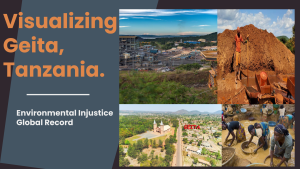Visualizing Geita
xxxx

xxxx

In this visit, we were focused on stringing seashells onto the wooden branches as art pieces for the exhibition.
In this visit, I spent most of my time talking to an ah ma from my weekly group.
We started our time at Naluwan with some morning dance moves to warm up our bodies. It was pleasant to see the elders actively participating in the exercise.
For this visit, Juanjuan and I were grouped with five grandmothers, three from the previous visit and two new grandmothers due to the absence of our classmates.
Driving through the small alley of the place where the Amis live felt odd as the modern view on my left - wind turbines, bridges, was a vast contrast from the view on my right which saw village-lik
A statue is built in the middle of the walkway that separates the river and the land that the Amis lives on.

The final edited version has published via Annual Reviews of Public Health.
“The Annual Review of Public Health, in publication since 1980, covers significant developments in the field of Public Health, including key developments in epidemiology and biostatistics, environmental and occupational health, issues related to social environment and behavior, health services, and public health practice.” [http://www.annualreviews.org/journal/publhealth]
The journal can help the health professionals by exploring not only contents in the sub-sections of Public Health but further more explore other detailed topics with other journal sections such as Medicine, Nutrition etc.
“The mission of Annual Reviews is to provide systematic, periodic examinations of scholarly advances in a number of fields of science through critical authoritative reviews. The comprehensive critical review not only summarizes a topic but also roots out errors of fact or concept and provokes discussion that will lead to new research activity. The critical review is an essential part of the scientific method.” [http://www.annualreviews.org/page/about/our-mission-and-our-founder]
“In 2015, MSF provided humanitarian assistance in 69 countries.
Around 54 per cent of activities were carried out in settings of instability. Some 57 per cent of programs were in Africa…MSF spent 1,283 million euros: 82 per cent was spent on humanitarian activities…” [http://www.msf.org/en/article/msf-international-activity-report-2015]
2. There is an urgently need of HIV/TB doctors in the field. [http://www.msf.org/en/work-msf/working-in-the-field]
“MSF provided care for 333,900 people living with HIV/AIDS and antiretroviral treatment for 240,100 people in 2015.” With the lack of appropriate medical educations, many people do not know they have infected with HIV. [MSF international_activity_report_2015_en_2nd_ed.pdf]
3. Close of Programs
“When a violent situation has stabilized sufficiently, and access to health services improves, MSF will close its program.”
“When local or national authorities and organizations have the capacity and motivation to restore and develop a medical system that meets the urgent needs of the population, MSF will withdraw.”
“MSF will close a program when a medical emergency ends.”
Artisanal or Snall Scale Mining in Geita.